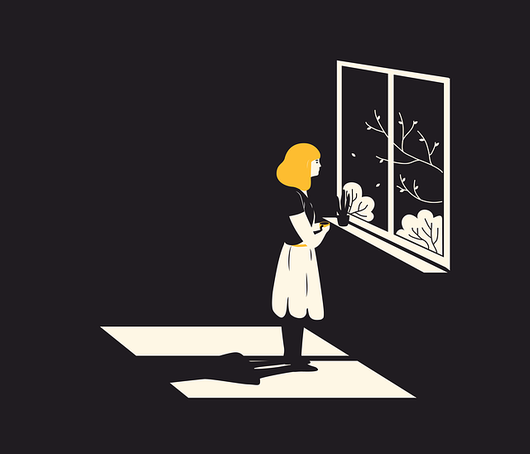
The Window
The man who had once lived in this home was a cigarette smoker—I smelled it in the walls. Some nights, alone, I sidled up to the bathroom wall and lay flat against it, arms over my head, inhaling. I longed for those trails of smoke following me through the house.
My husband had been on the road. I pictured a calendar with the days falling away. Three months gone. His smell—Carmex, strawberry shampoo, cigarettes—no longer clung to his clothes.
The day he had left, I started sleeping in the sunroom. We talked on the phone every day for a long time, but the calls became conversations of nothing. The weather, where the dispatcher had sent him, a friend moving. Our words were hollow. But he never called at night.
Time moved like fish fighting the ocean tide. Hours on the phone, newlyweds that we were, turned to sand. There was only silence. More silence.
My husband stopped calling. Four months gone. Five months gone.
One day, the scent that had lingered in the walls, dissolved. The only smell was my own breathing drifting back to me.
Night watched me through clear panes, so I watched it too.
Edged in fairy lights, the sunroom windows made my face a shadow without edges. A streaked image blinked against the glass. So many times, I reached for my face, to remind myself I was alive and not an image in a fishbowl.
I checked my phone often, curled into a ball.
The nights became longer, my face more distorted until I was nothing but a long line, a heartbeat stopped. Sometimes I'd turn around in the hopes that I would find my husband there.
Still, every morning, I played out the routine. Coffee, shower, dress.
Then I'd snuggle against the bathroom wall and remember the smell of cigarettes there, of Carmex and strawberry shampoo. I imagined the man who lived here and was dead could make me whole again.
The man who had once lived in this home was a cigarette smoker—I smelled it in the walls. Some nights, alone, I sidled up to the bathroom wall and lay flat against it, arms over my head, inhaling. I longed for those trails of smoke following me through the house.
My husband had been on the road. I pictured a calendar with the days falling away. Three months gone. His smell—Carmex, strawberry shampoo, cigarettes—no longer clung to his clothes.
The day he had left, I started sleeping in the sunroom. We talked on the phone every day for a long time, but the calls became conversations of nothing. The weather, where the dispatcher had sent him, a friend moving. Our words were hollow. But he never called at night.
Time moved like fish fighting the ocean tide. Hours on the phone, newlyweds that we were, turned to sand. There was only silence. More silence.
My husband stopped calling. Four months gone. Five months gone.
One day, the scent that had lingered in the walls, dissolved. The only smell was my own breathing drifting back to me.
Night watched me through clear panes, so I watched it too.
Edged in fairy lights, the sunroom windows made my face a shadow without edges. A streaked image blinked against the glass. So many times, I reached for my face, to remind myself I was alive and not an image in a fishbowl.
I checked my phone often, curled into a ball.
The nights became longer, my face more distorted until I was nothing but a long line, a heartbeat stopped. Sometimes I'd turn around in the hopes that I would find my husband there.
Still, every morning, I played out the routine. Coffee, shower, dress.
Then I'd snuggle against the bathroom wall and remember the smell of cigarettes there, of Carmex and strawberry shampoo. I imagined the man who lived here and was dead could make me whole again.